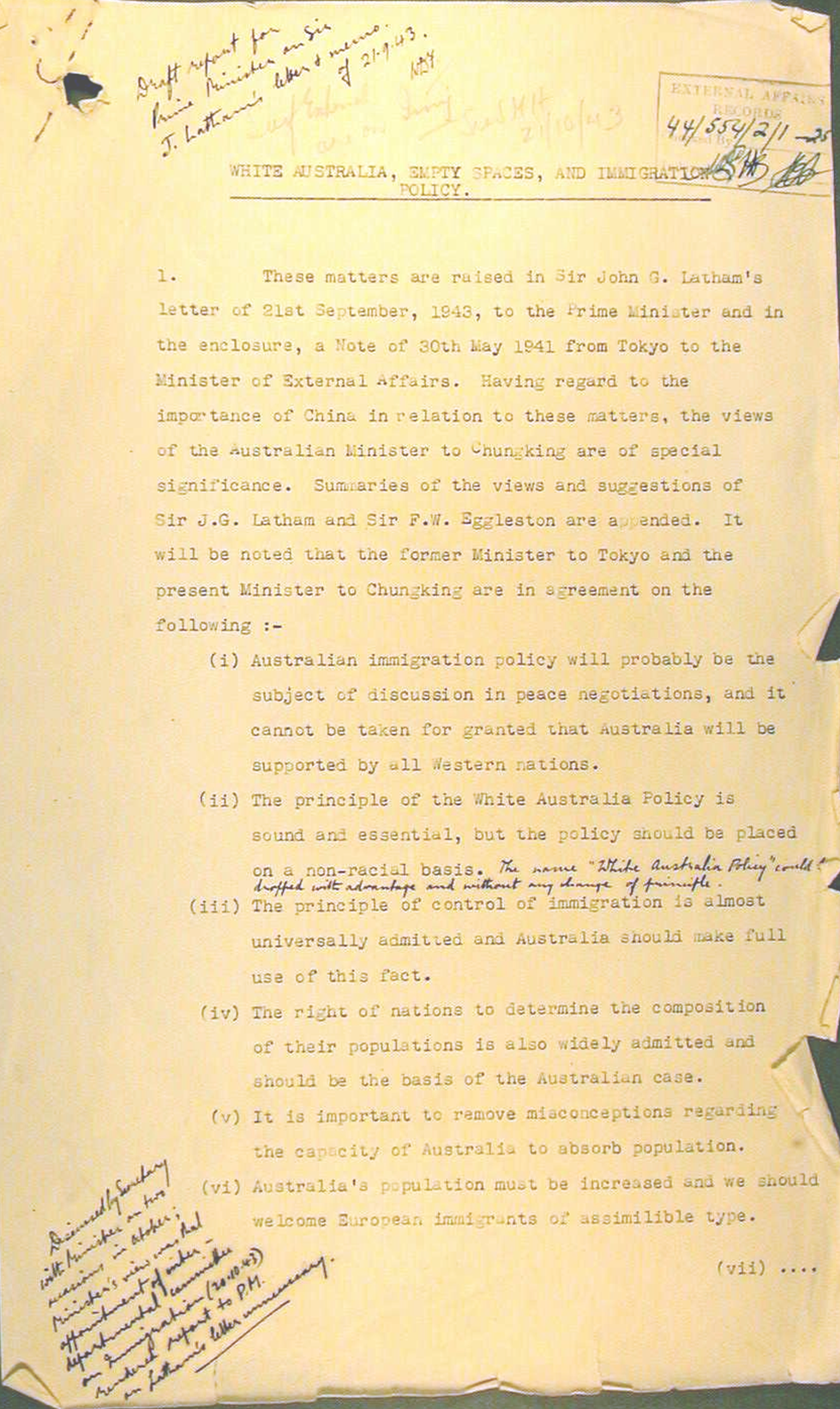
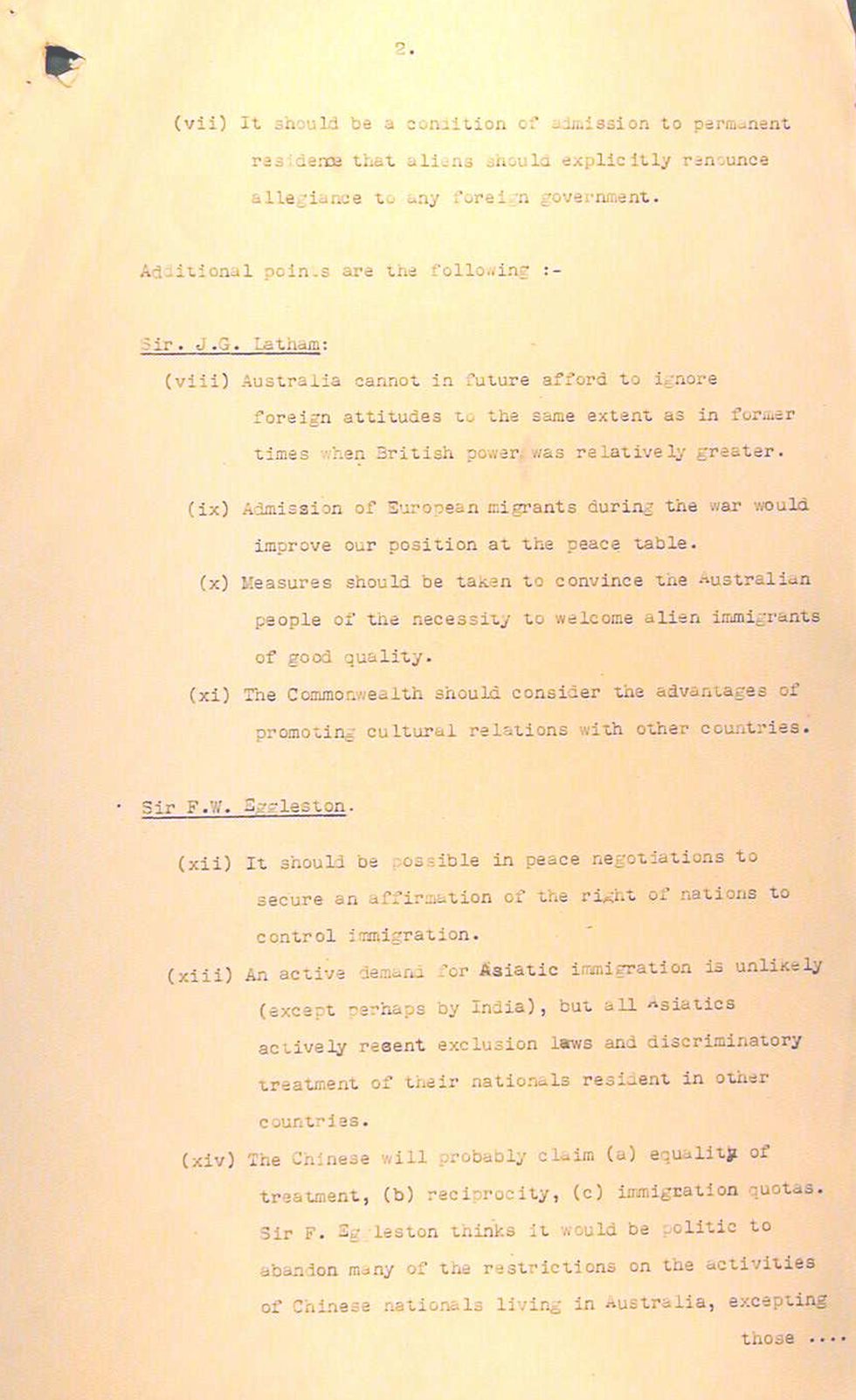
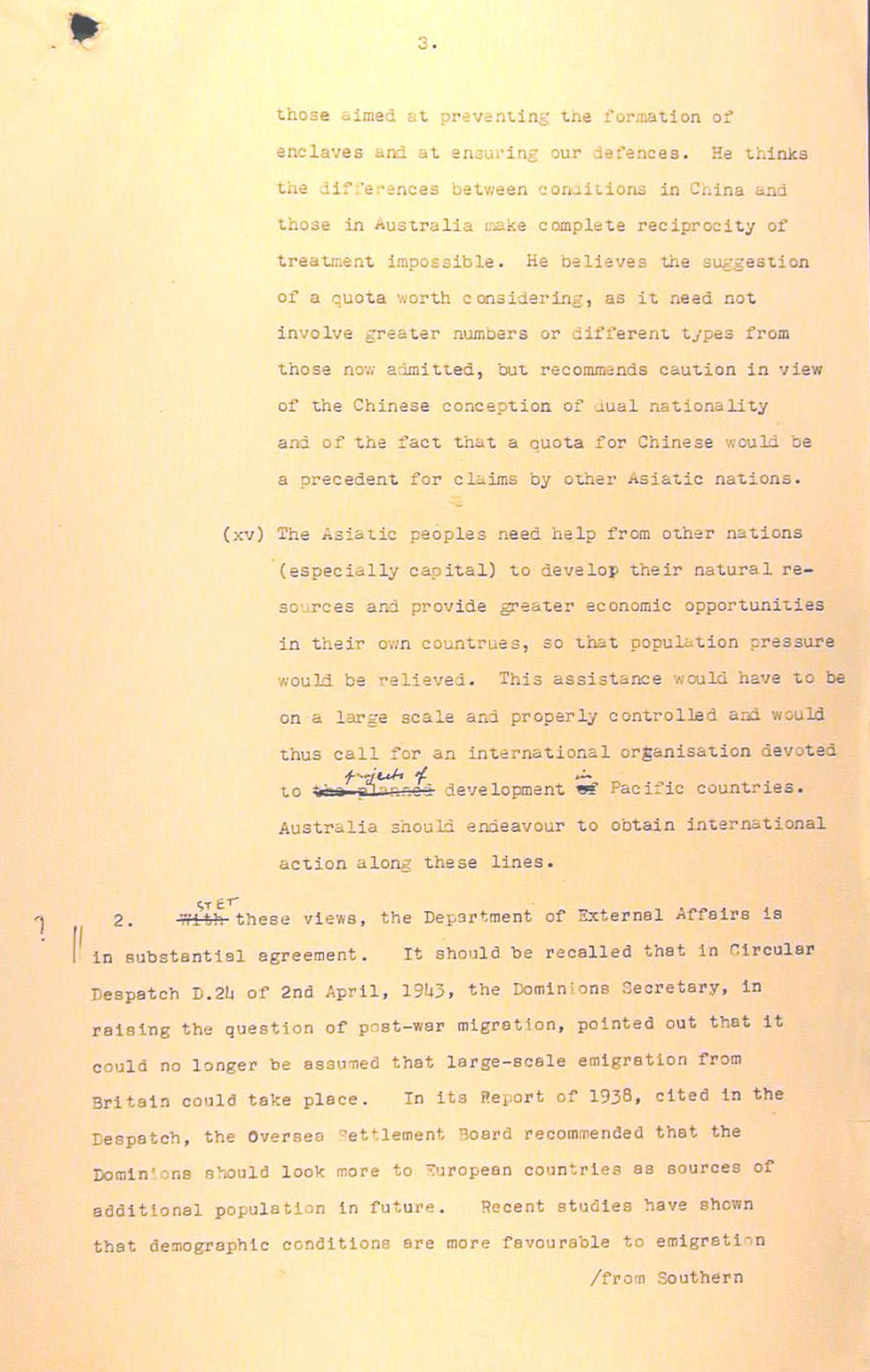

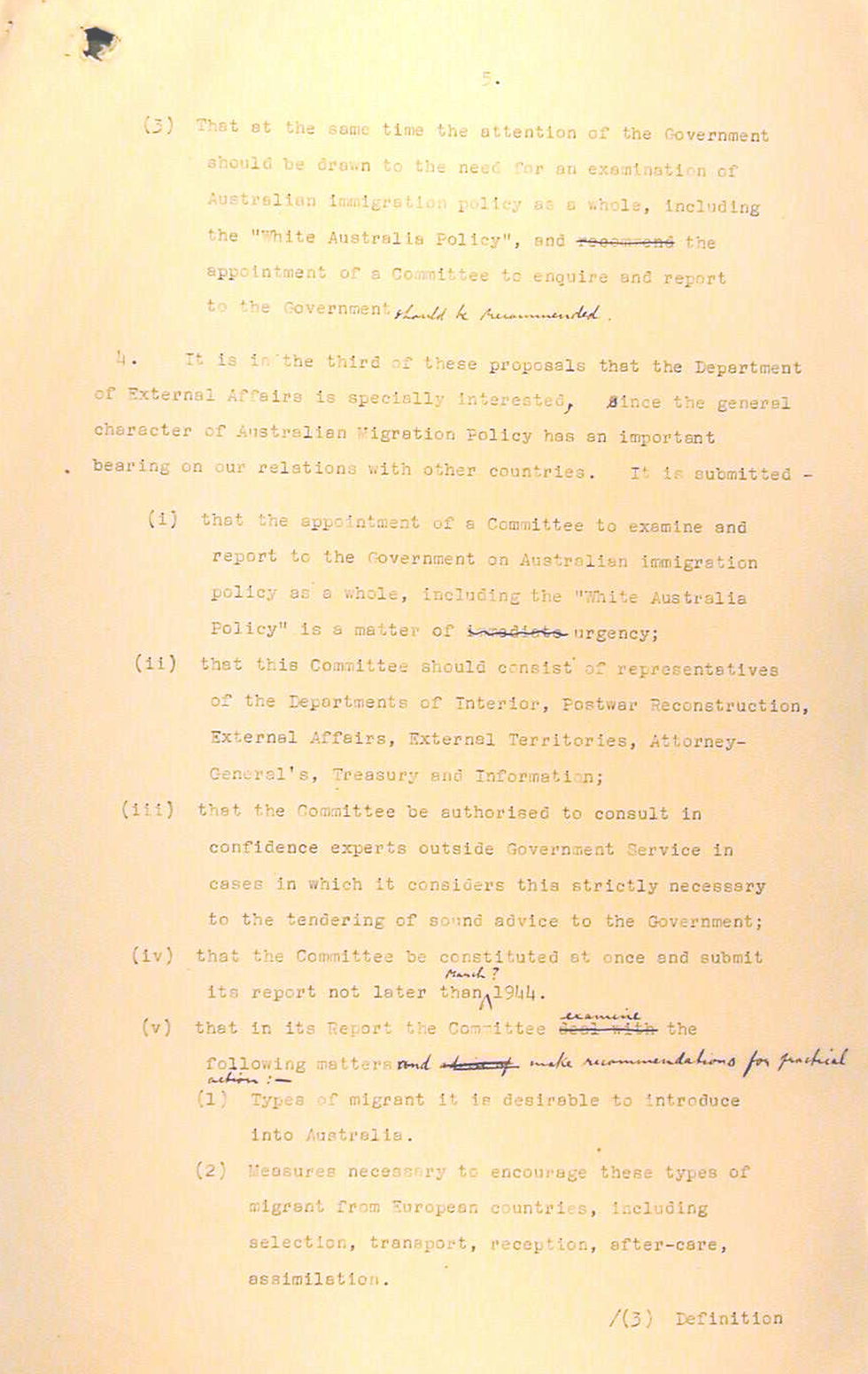
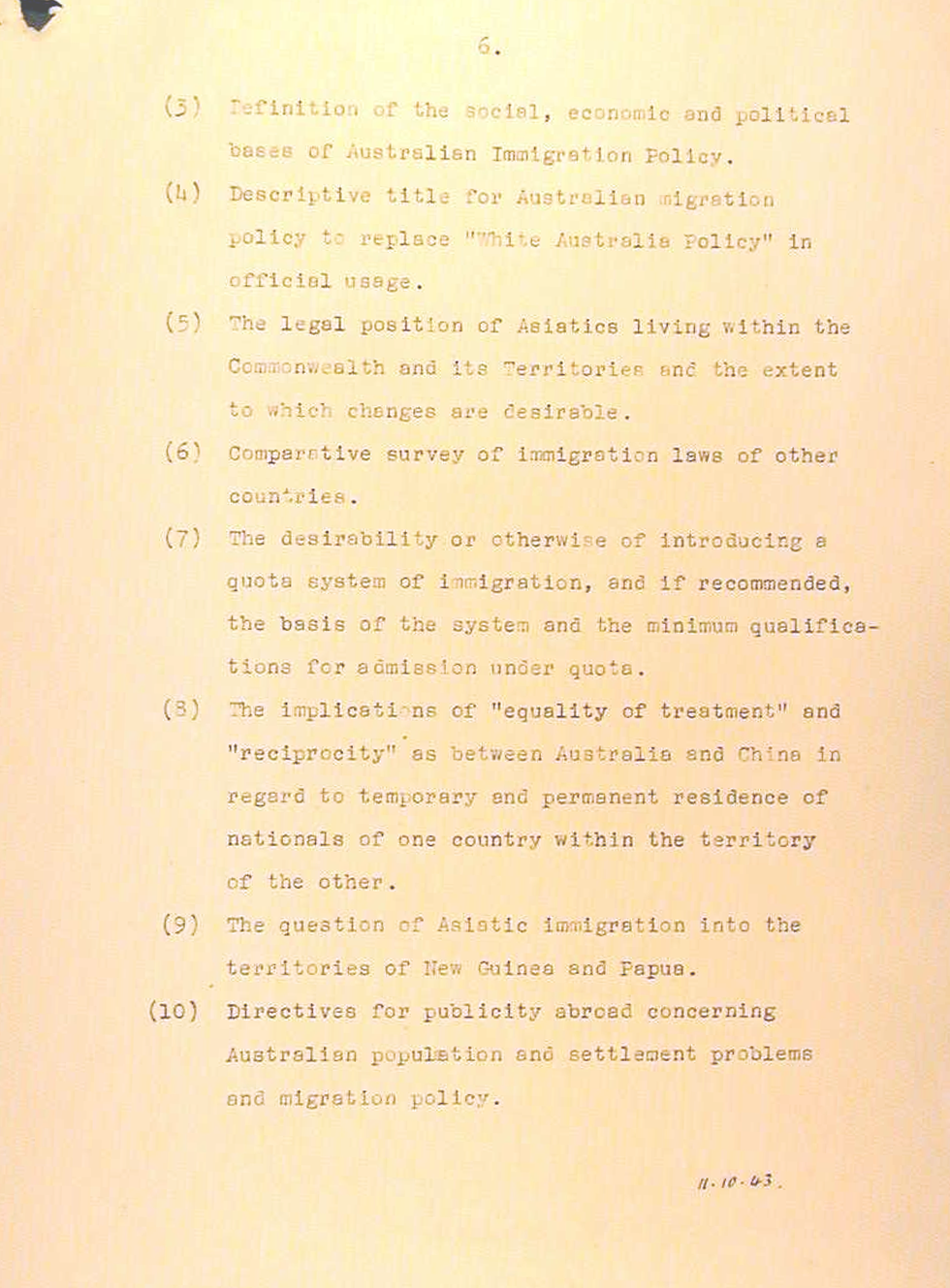
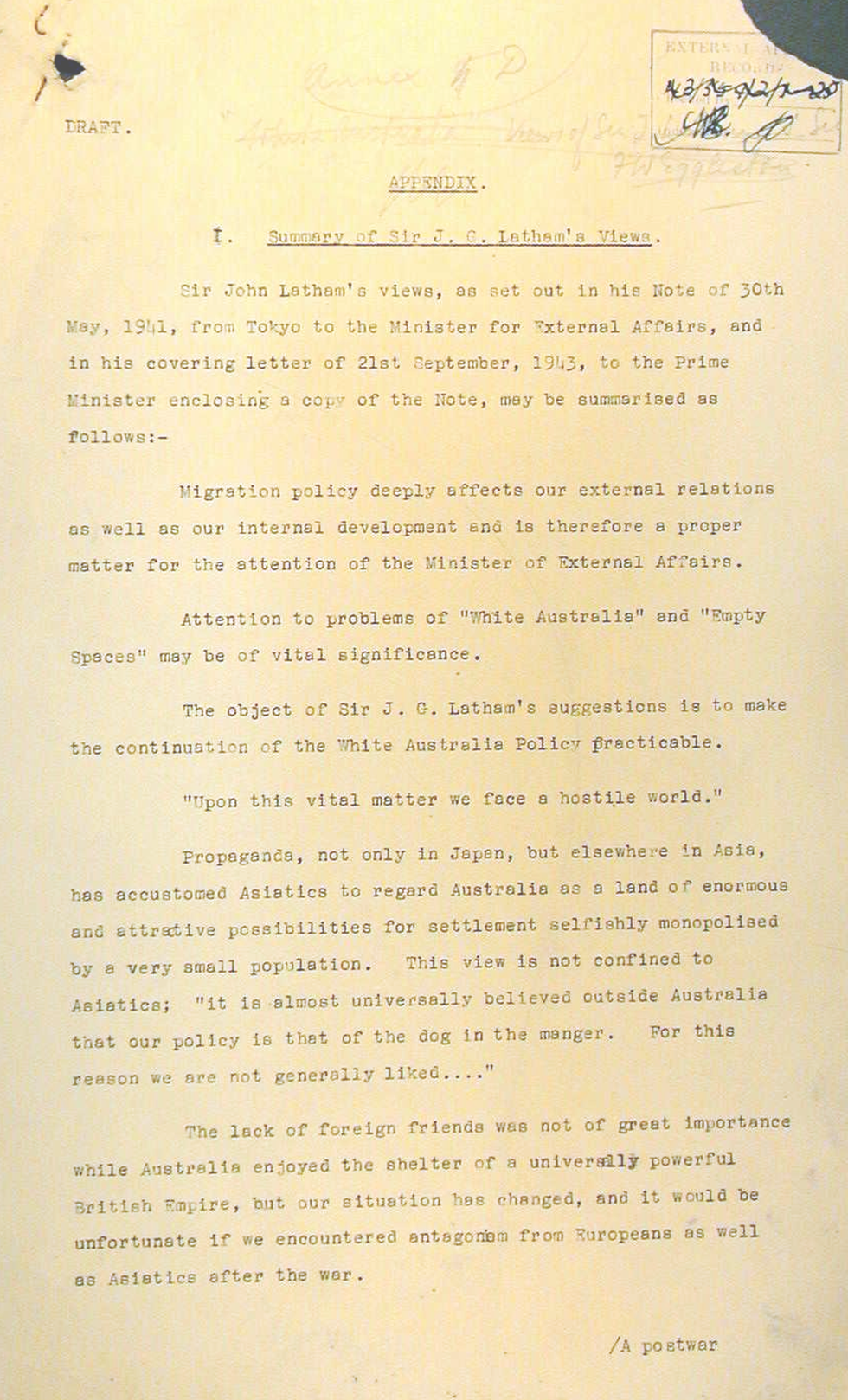
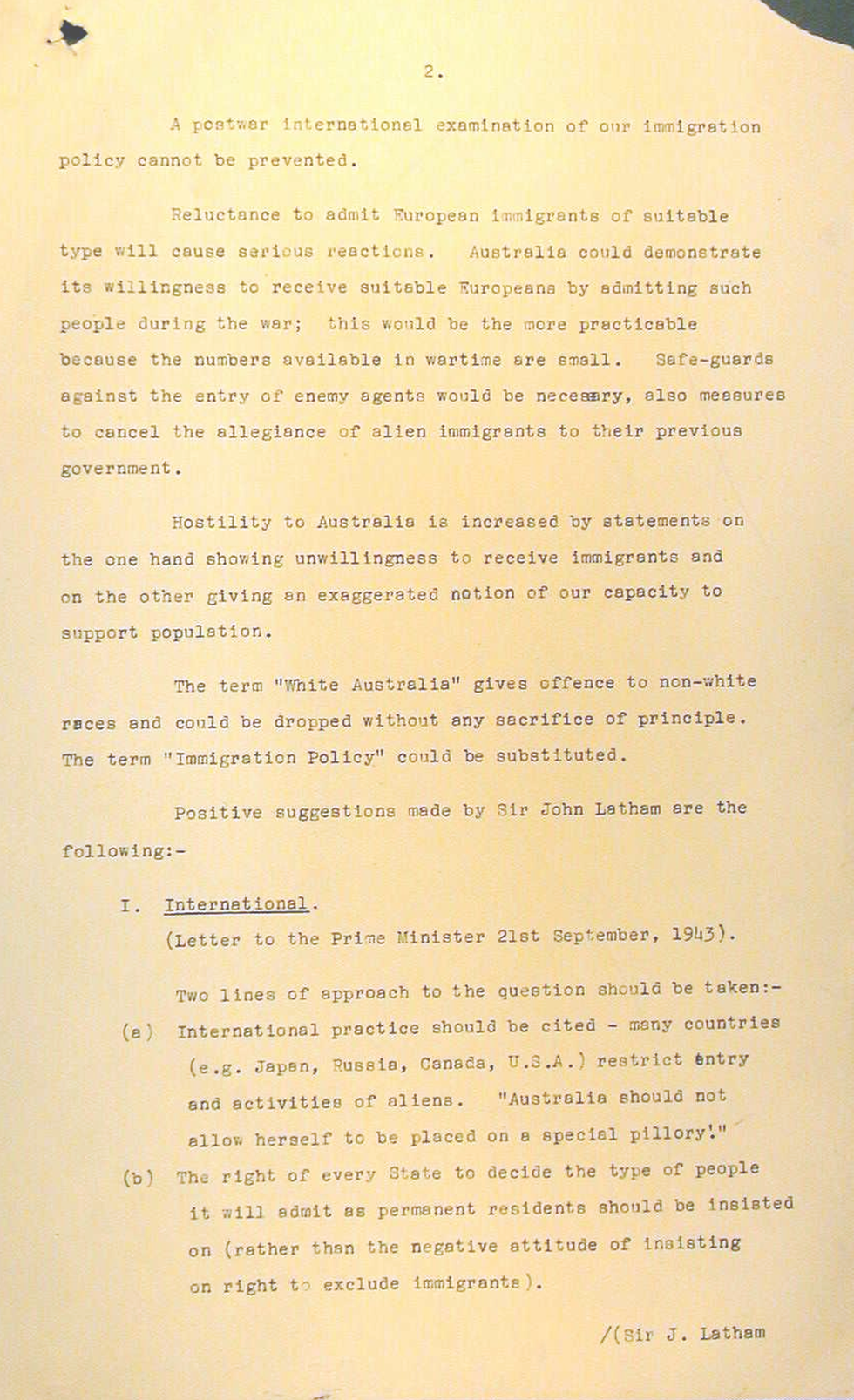
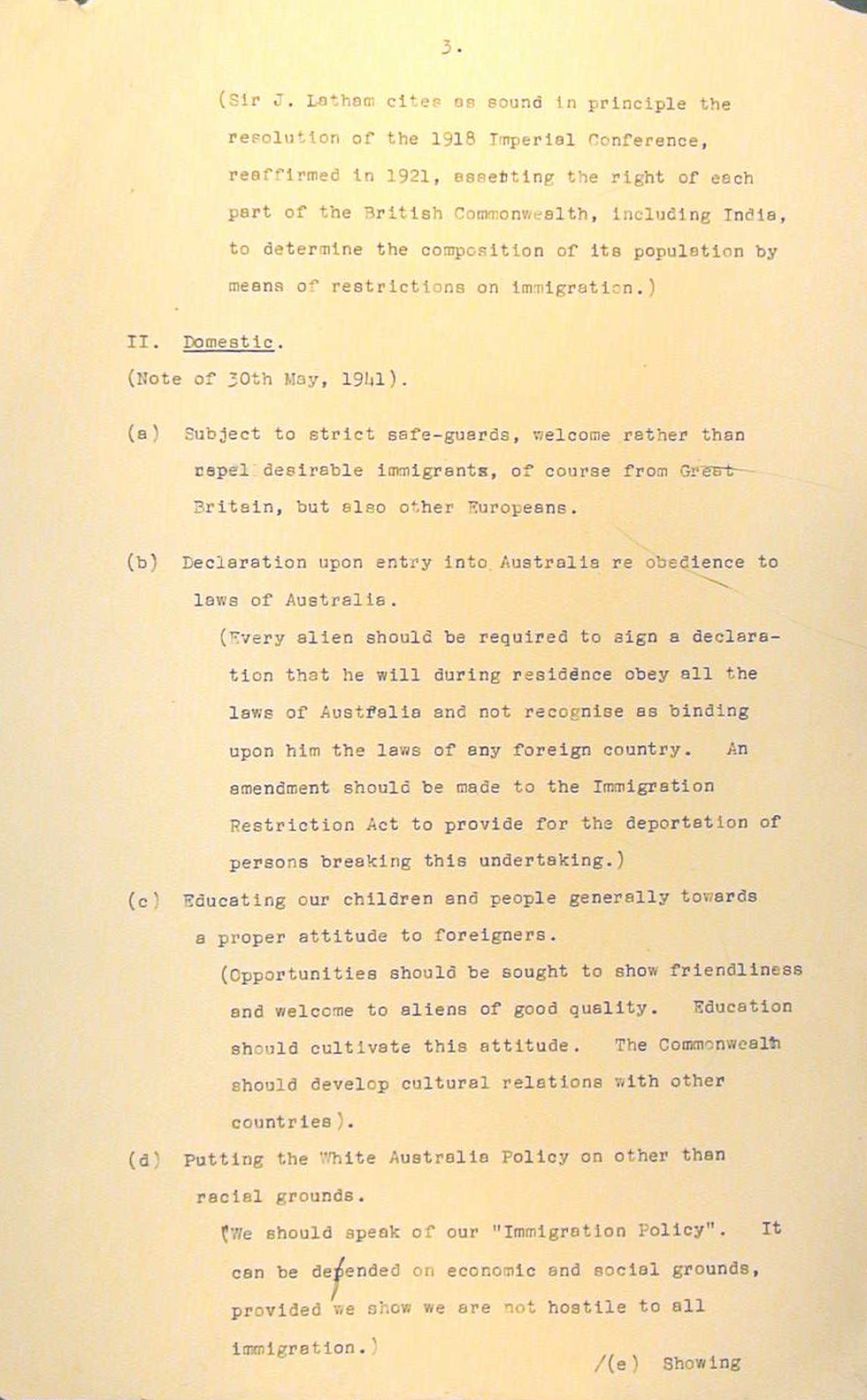
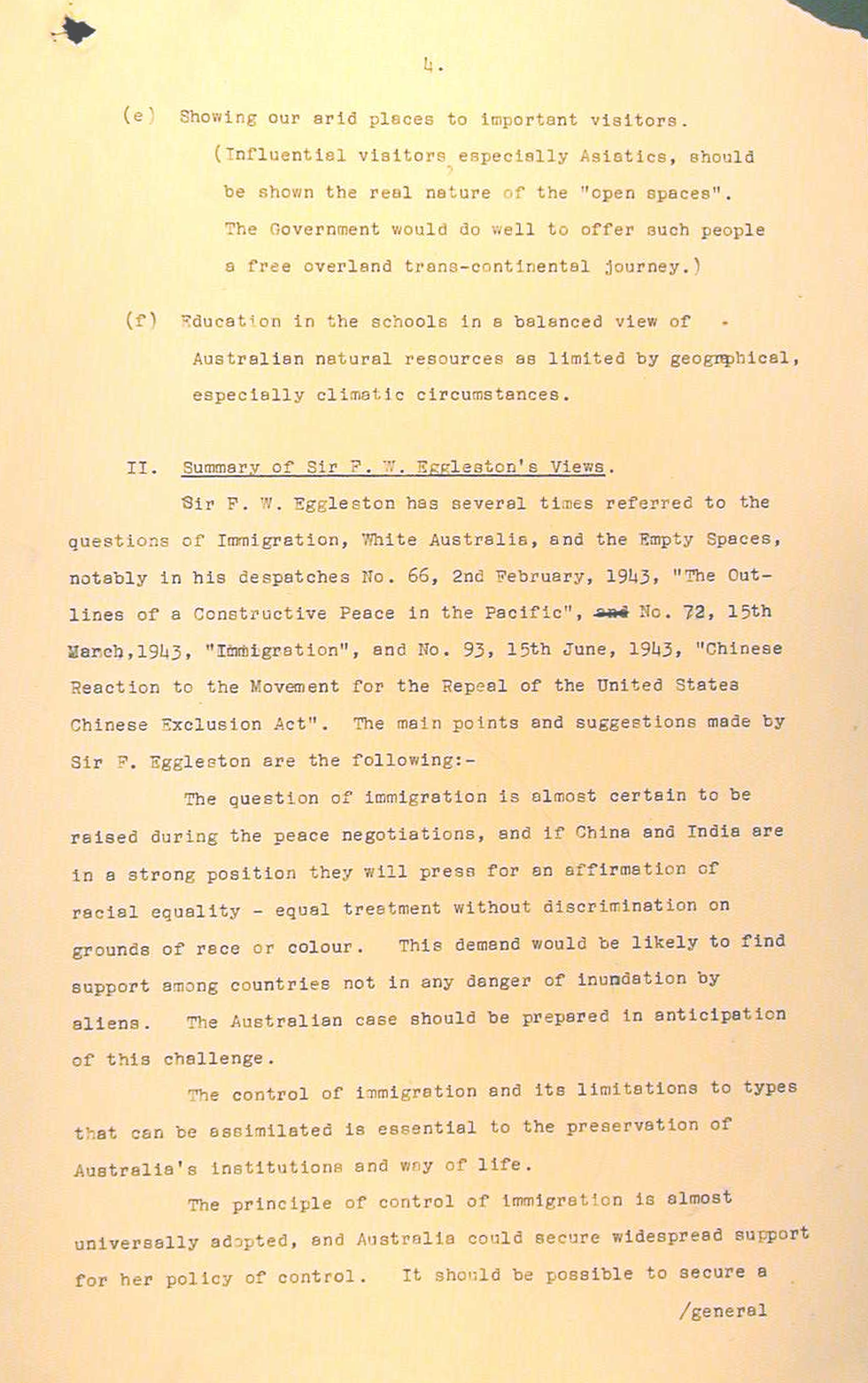
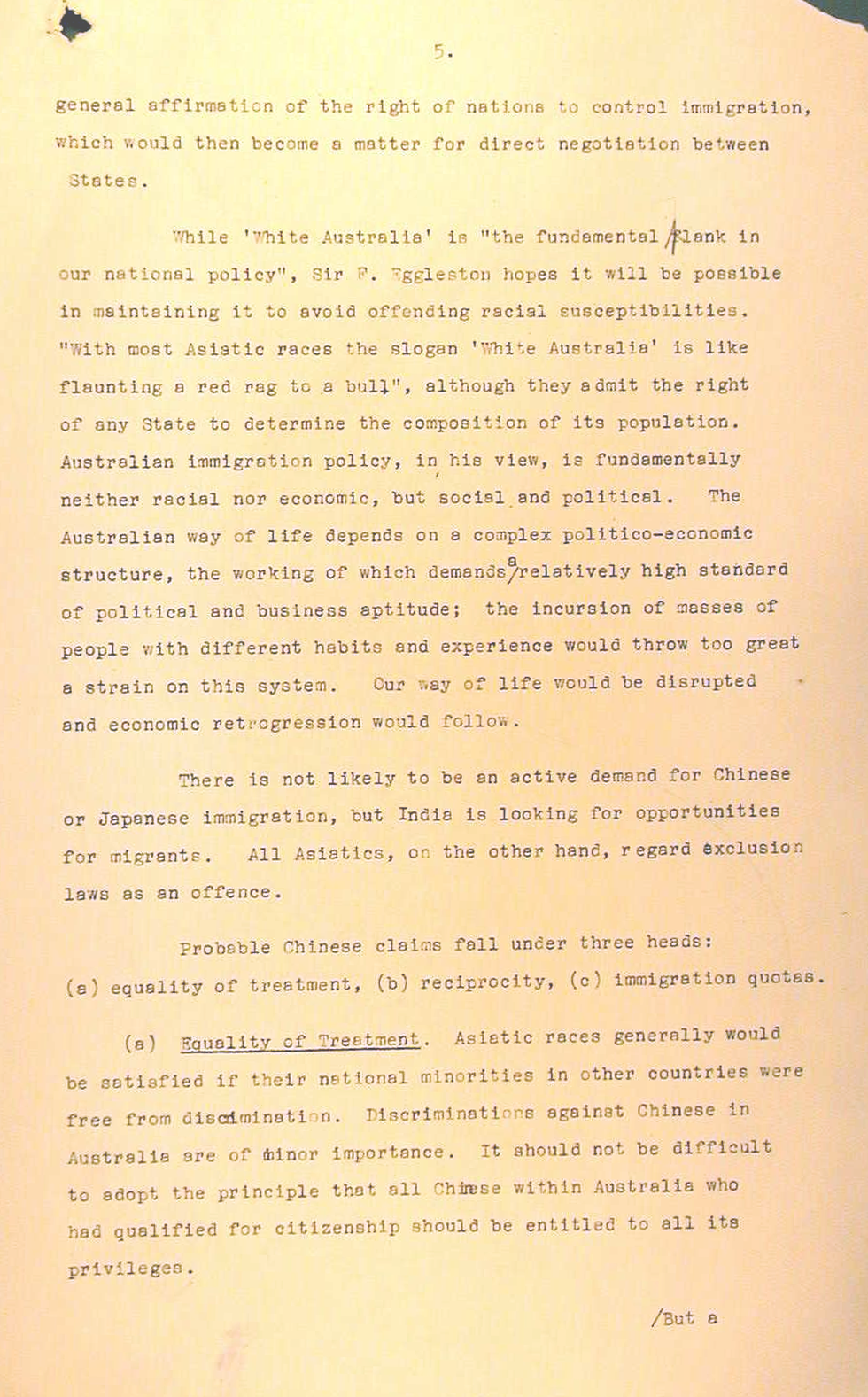

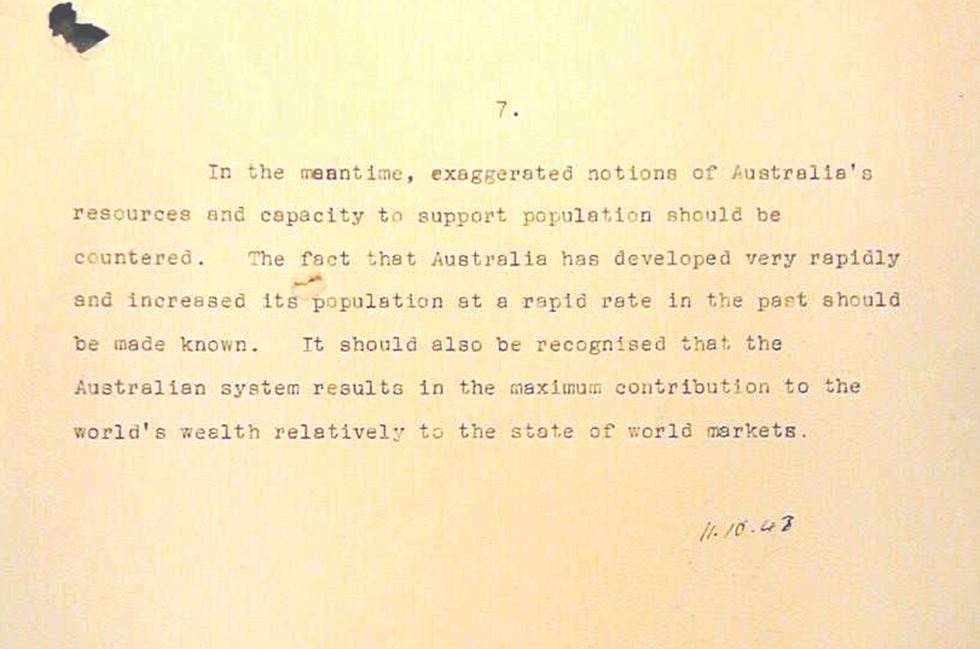
Aboriginal and Torres Strait Islander people should be aware that the National Archives' website and collection contain the names, images and voices of people who have died.
Some records include terms and views that are not appropriate today. They reflect the period in which they were created and are not the views of the National Archives.














[handwritten] Draft report for Prime Minister on Sir J. Latham's letter and memo of 21.9.43. [initial]
[pencil, illegible] [end handwriting]
[underlined] WHITE AUSTRALIA, EMPTY SPACES, AND IMMIGRATION POLICY. [end underlined]
[stamp, reading 'EXTERNAL AFFAIRS RECORDS'. Handwritten inside the stamp reads the numbers '44/554/2/1-25' and a signature]
1. These matters are raised in Sir John G. Latham's letter of 21st September, 1943, to the Prime Minister and in the enclosure, a Note of 30th May 1941 from Tokyo to the Minister of External Affairs. Having regard to the importance of China in relation to these matters, the views of the Australian Minister to Chungking are of special significance. Summaries of the views and suggestions of Sir J. G. Latham and Sir F. W. Eggleston are appended. It will be noted that the former Minister to Tokyo and the present minister to Chungking are in agreement on the following :-
(i) Australian immigration policy will probably be the subject of discussion in peace negotiations, and it cannot be taken for granted that Australia will be supported by all Western nations.
(ii) The principle of the White Australia Policy is sound and essential, but the policy should be placed on a non-racial basis. [handwritten] The name "White Australia Policy" could be drafted with advantage and without any damage of principle. [end handwritten]
(iii) The principle of control of immigration is almost universally admitted and Australia should make full use of this fact.
(iv) The right of nations to determine the composition of their populations is also widely admitted and should be the basis of the Australian case.
(v) It is important to remove misconceptions regarding the capacity of Australia to absorb population
(vi) Australia's population must be increased and we should welcome European immigrants of assimilable type.
[Handwritten] Received by Secretary with Minister [illegible] in October; Minister's view [illegible] that appointment of [illegible] departmental committee on Immigration (20.10.43) [illegible] report to P.M. on Latham's letter unnecessary. [end handwritten]
(vii)….
[end page 1]
[continued on page 2]
2.
(vii) It should be a condition of admission to permanent residence that aliens should explicitly renounce allegiance to any foreign government.
Additional points are the following :-
[underlined] Sir J. G. Latham: [end underlined]
(viii) Australia cannot in future afford to ignore foreign attitudes to the same extent as in former times when British power was relatively greater.
(ix) Admission of European migrants during the war would improve our position at the peace table.
(x) Measures should be taken to convince the Australian people of the necessity to welcome alien immigrants of good quality.
(xi) The Commonwealth should consider the advantages of promoting cultural relations with other countries.
[underlined] Sir F. W. Eggleston. [end underlined]
(xii) It should be possible in peace negotiations to secure an affirmation of the right of nations to control immigration.
(xiii) An active demand for Asiatic immigration is unlikely (except perhaps by India), but all Asiatics actively resent exclusion laws and discriminatory treatment of their nationals resident in other countries.
(xiv) The Chinese will probably claim (a) equality of treatment, (b) reciprocity, (c) immigration quotas. Sir F. Eggleston thinks it would be politic to abandon many of the restrictions on the activities of Chinese nationals living in Australia, excepting those ….
[end page 2]
[continued on page 3]
3.
those aimed at preventing the formation of enclaves and at ensuring our defences. He thinks the differences between conditions in China and those of Australia make complete reciprocity of treatment impossible. He believes the suggestion of a quota worth considering, as it need not involve greater numbers or different types from those now admitted, but recommends caution in view of the Chinese conception of dual nationality and the fact that a quota for Chinese would be a precedent for claims by other Asiatic nations.
(xv) The Asiatic peoples need help from other nations (especially capital) to develop their natural resources and provide greater economic opportunities in their own countrues [sic], so that population pressure would be relieved. This assistance would have to be on a large scale and properly controlled and would thus call for an international organisation devoted to [crossed out] the planned [end crossed out] [handwritten] projects of [end handwritten] development [crossed out] of [end crossed out] [handwritten] in [end handwritten] Pacific countries. Australia should endeavour to obtain international action along these lines.
2. [crossed out] With [end crossed out] [handwritten] STET [end handwritten] these views, the Department of External Affairs is in substantial agreement. [handwritten question mark to the left of this sentence]. It should be recalled that in Circular Despatch D.24 of 2nd April, 1943, the Dominions Secretary, in raising the question of post-war migration, pointed out that it could no longer be assumed that large scale emigration from Britain could take place. In its Report of 1938, cited in the Despatch, the Oversea Settlement Board recommended that the Dominions should look more to European countries as sources of additional population in future. Recent studies have shown that demographic conditions are more favourable to emigration
/from Southern
[end page 3]
[continued on page 4]
4.
from Southern and Eastern European countries than from the Northern and Western. The effects of the war may stimulate emigration from the latter for some years; nevertheless on a long-term view, it is likely that overseas countries seeking large numbers of white migrants will have to pay greater attention to Southern and Eastern European sources, and to the problems of assimilation. Broadly speaking, Australia will have the alternatives in future of assimilating Southern and Eastern Europeans or remaining thinly-populated in the face of a crowded Asia.
3. The preceding paragraphs raise questions of high policy and matters which in practical administration would be the concern of several Departments. Preliminary consideration was given [crossed out] them in [end crossed out] [handwritten] to have questions by [end handwritten] an interdepartmental conference held at the Department of the Interior on 9th June, 1943, to consider Circular Despatch D.24. This meeting, which was convened by the Secretary of the Department of the Interior, comprised representatives of that Department and of the Departments of External Affairs, Post-war Reconstruction and Treasury. The meeting agreed: -
(1) The Department of the Interior should draft for submission to the Government an immediate reply to Despatch D.24 regarding migration from Britain. This reply should follow the lines of the statement made to the meeting by Mr. Carrodus.
(2) That at the same time the Department of the Interior should report to the Government that there were certain details in the British proposals which needed further examination by a committee representative of the Departments of the Interior, Treasury, Post-War Reconstruction, Social Services and of the Repatriation Commission.
/(3) That
[end page 4]
[continued on page 5]
5.
(3) That at the same time the attention of the Government should be drawn to the need for an examination of Australian immigration policy as a whole, including the "White Australia Policy", ad [crossed out] recommend [end crossed out] the appointment of a Committee to enquire and report to the Government [handwritten] should be recommended. [end handwritten]
4. It is in the third of these proposals that the Department of External Affairs specially interested, since the general character of Australian Migration Policy has an important bearing on our relations with other countries. It is submitted –
(i) that the appointment of a Committee to examine and report to the Government on Australian immigration policy as a whole, including the "White Australia Policy" is a matter of [crossed out] immediate [end crossed out] urgency;
(ii) that this Committee should consist of representatives of the Departments of Interior, Postwar Reconstruction, External Affairs, External Territories, Attorney General's, Treasury and Information;
(iii) that the Committee be authorised to consult in confidence experts outside Government Service in cases in which it considers this strictly necessary to the tendering of sound advice to the Government;
(iv) that the Committee be constituted at once and submit its report not later than [handwritten] March? [end handwritten]1944.
(v) that in its report the Committee [crossed out] deal with [end crossed out] [handwritten] examine [end handwritten] the following matters [handwritten] and make recommendations for practical action :- [end handwritten]
(1) Types of migrant it is desirable to introduce into Australia.
(2) Measures necessary to encourage these types of migrant from European countries, including selection, transport, reception, after-care, assimilation.
/(3) Definition
[end page 5]
[continued on page 6]
6.
(3) Definition of the social, economic and political bases of Australian Immigration Policy.
(4) Descriptive title for Australian migration policy to replace "White Australia Policy" in official usage.
(5) The legal position of Asiatics living within the Commonwealth and its Territories and the extent to which changes are desirable
(6) Comparative survey of immigration laws of other countries.
(7) The desirability or otherwise of introducing a quota system of immigration, and if recommended, the basis of the system and the minimum qualifications for admission under quota.
(8) The implications of "equality of treatment" and "reciprocity" as between Australia and China in regard to temporary and permanent residence of nationals of one country within the territory of the other.
(9) The question of Asiatic immigration into the territories of New Guinea and Papua.
(10) Directives for publicity abroad concerning Australian population and settlement problems and migration policy.
[handwritten] 11.10.43 [end handwritten]
[end page 6]
[page 7, new document]
DRAFT.
[unclear pencil handwriting, possibly reading 'Annex 5D', circled, and 'Views of Sir J Latham and Sir F W Eggleston.' Part of the writing is covered by an 'EXTERNAL AFFAIRS RECORD' stamp in the top right corner, where the page has been ripped. Inside the stamp in black ink is a handwritten number that has been crossed out, and two initials.]
[underlined] APPENDIX.
I. Summary of Sir J.G. Latham's Views. [end underlined]
Sir John Latham's view, as set out in his Note of 30th May 1941, from Tokyo to the Minister for External Affairs, and in his covering letter of 21st September, 1943, to the Prime Minister enclosing a copy of the Note, may be summarised as follows:-
Migration policy deeply affects our external relations as well as our internal development and is therefore a proper matter for the attention of the Minister of External Affairs.
Attention to problems of "White Australia" and "Empty Spaces" may be of vital significance.
The object of Sir J.G. Latham's suggestions is to make the continuation of the White Australia Policy practicable.
"Upon this vital matter we face a hostile world"
Propaganda, not only in Japan, but elsewhere in Asia, has accustomed Asiatics to regard Australia as a land of enormous and attractive possibilities for settlement selfishly monopolised by a very small population. This view is not confined to Asiatics; "it is almost universally believed outside Australia that our policy is that of the dog in the manger. For this reason we are not generally liked…."
The lack of foreign friends was not of great importance while Australia enjoyed the shelter of a universally powerful British Empire, but our situation has changed, and it would be unfortunate if we encountered antagonism from Europeans as well as Asiatics after the war.
/A postwar
[end of page 7]
[continued on page 8]
2.
A postwar international examination of our immigration policy cannot be prevented.
Reluctance to admit European immigrants of suitable type will cause serious reactions. Australia could demonstrate its willingness to receive suitable Europeans by admitting such people during the war; this would be more practicable because the numbers available in wartime are small. Safe-guards against the entry of enemy agents would be necessary, also measures to cancel the allegiance of alien immigrants to their previous government.
Hostility to Australia is increased by statements on the one hand showing unwillingness to receive immigrants and on the other giving an exaggerated notion of our capacity to support population.
The term "White Australia" gives offence to non-white races and could be dropped without any sacrifice of principle. The term "Immigration Policy" could be substituted.
Positive suggestions made by Sir John Latham are the following:-
I. [underlined] International. [end underlined]
(letter to the Prime Minister 21st September, 1943).
Two lines of approach to the question should be taken:-
(a) International practice should be cited – many countries (e.g. Japan, Russia, Canada, U.S.A.) restrict entry and activities of aliens. "Australia should not allow herself to be placed on a special pillory'."
(b) The right of every State to decide the type of people it will admit as permanent residents should be insisted on (rather than the negative attitude of insisting on right to exclude immigrants).
/(Sir J. Latham
[end of page 8]
[continued on page 9]
3.
(Sir J Latham cites as sound in principle the resolution of the 1918 Imperial Conference, reaffirmed in 1921, assenting the right of each part of the British Commonwealth, including India, to determine the composition of its population by means of restrictions on immigration.
II. [underlined] Domestic [end underlined]
(Note of 30th May, 1941).
(a) Subject to strict safe-guards, welcome rater than repel desirable immigrants, of course from Great Britain, but also other Europeans.
(b) Declaration upon entry into Australia re obedience to laws of Australia
(Every alien should be required to sign a declaration that he will during residence obey all the laws of Australia and not recognise as binding upon him the laws of any foreign country. An amendment should be made to the Immigration Restriction Act to provide for the deportation of persons breaking this undertaking.)
(c) Educating our children and people generally towards a proper attitude to foreigners.
(Opportunities should be sought to show friendliness and welcome to aliens of good quality. Education should cultivate this attitude. The Commonwealth should develop cultural relations with other countries).
(d) Putting the White Australia Policy on other than racial grounds.
(We should speak pf our "Immigration Policy". It can be depended on economic and social grounds, provided we show we ae not hostile to all immigration.)
/(e) Showing
[end page 9]
[continued on page 10]
4.
(e) Showing our arid places to important visitors.
(Influential visitors especially Asiatics, should be shown the real nature of the "open spaces". The Government would do well to offer such people a free overland trans-continental journey.)
(f) Education in the schools in a balanced view of Australian natural resources as limited by geographical, especially climatic circumstances.
II. [underlined] Summary of Sir F.W. Eggleston's Views. [end underlined]
Sir F.W. Eggleston has several times referred to the questions of Immigration, White Australia, and the Empty Spaces, notably in his despatches No.66, 2nd February, 1943, "The Outlines of a Constructive Peace in the Pacific", [crossed out] and [end crossed out] No. 72, 15th March 1943, "Immigration", and No. 93, 15h June, 1943, "Chinese Reaction to the Movement for the Repeal of the United States Chinese Exclusion Act". The main points and suggestions made by Sir F. Eggleston are the following: -
The question of immigration is almost certain to be raised during the peace negotiations, and if China and India are in a strong position they will press for an affirmation of racial equality – equal treatment without discrimination on grounds of race or colour. This demand would be likely to find support among countries not in any danger of inundation by aliens. The Australian case should be prepared in anticipation of this challenge.
The control of immigration and its limitations to types that can be assimilated is essential to the preservation of Australia's institutions and way of life.
The principle of control of immigration is almost universally adopted, and Australia could secure widespread support for her policy of control. It should be possible to secure a
/general
[end page 10]
[continued on page 11]
5.
general affirmation of the right of nations to control immigration, which would then become a matter for direct negotiation between States.
While 'White Australia' is "the fundamental flank in our national policy", Sir F. Eggleston hopes it will be possible in maintaining it to avoid offending racial susceptibilities. "With most Asiatic races the slogan 'White Australia' is like flaunting a red rag to a bull", although they admit the right of any State to determine the composition of its population. Australian immigration policy, in his view, is fundamentally neither racial nor economic, but social and political. The Australian way of life depends on a complex politico-economic structure, the working of which demands a relatively high standard of political and business aptitude; the incursion of masses of people with different habits and experience would throw too great a strain on this system. Our way of life would be disrupted and economic retrogression would follow.
There is not likely to be an active demand for Chinese or Japanese immigration, but India is looking for opportunities for migrants. All Asiatics, on the other hand, regard exclusion laws as an offence.
Probable Chinese claims fall under three heads:
(a) equality of treatment, (b) reciprocity, (c) immigration quotas.
(a) [underlined] Equality of Treatment. [end underlined] Asiatic races generally would be satisfied if their national minorities in other countries were free from discrimination. Discriminations against Chinese in Australia are of minor importance. It should not be difficult to adopt the principle that all Chinese within Australia who had qualified for citizenship should be entitled to all its privileges.
/But a
[end page 11]
[continued on page 12]
6.
But a binding agreement to grant equality of treatment might be injudicious because of (i) the Chinese doctrine of dual nationality- citizenship should be granted to the Chinese in Australia only if they accept exclusive allegiance to Australia; (ii) the Chinese tend to form enclaves – special laws regarding language and education might be necessary; and (iii) defence considerations may necessitate excluding aliens from holding certain offices and from residing in certain areas.
(b) [underlined] Reciprocity. [end underlined] The differences between Australian and Chinese condition (e.g. legal systems, taxation, etc.) are so great that a comprehensive treaty for genuine reciprocal treatment could not be framed. But having regard to China's key position and the importance of future Sino-Australia relations, any Chinese proposals regarding reciprocal treatment should be given full consideration.
(c) [underlined] Immigration Quotas. [end underlined]. It is likely that U.S.A and other countries will admit Chinese in a quota system on the same basis as they admit other immigrants. The Chinese are likely to ask Australia for a quota if they raise the question of immigration with us. A considerable number of Chinese are now admitted as students and businessmen. A quota of 100 a year would be less than the number now admitted, and the same classes could be specified. It should be noted, however, that other Asiatic nations would probably also claim a quota if the Chinese were granted one.
Australia's position will not be secure until the population has been very greatly increased- to at least 20 million. We should plan for an annual immigration of about 50,000 assimilable people.
/In the meantime,
[end page 12]
[continued on page 13]
7.
In the meantime, exaggerated notions of Australia's resources and capacity to support population should be countered. The fact that Australia has developed very rapidly and increased its population at a rapid rate in the past should be made known. It should also be recognised that the Australian system results in the maximum contribution to the world's wealth relatively to the state of world markets.
[handwritten] 11.10.43
Learn how to interpret primary sources, use our collection and more.
